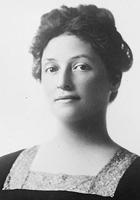Josephine Preston Peabody
Josephine Preston Peabody Poems
Moon in heaven's garden, among the clouds that wander,
Crescent moon so young to see, above the April ways,
...
The little Road says, Go,
The little House says, Stay:
And O, it's bonny here at home,
But I must go away.
...
'Wolf, Wolf-stay-at-home,
Prowler, -- scout,
Clanless and castaways,
And ailing with the drought,
...
Three women crept at break of day
A-grope along the shadowy way
Where Joseph's tomb and garden lay.
...
Over the twilight field,
Over the glimmering field
And bleeding furrows, with their sodden yield
Of sheaves that still did writhe,
...
The hills far-off were blue, blue,
The hills at hand were brown;
And all the herd-bells called to me
As I came by the down.
...
Yes, Nightingale, through all the summer-time
We followed on, from moon to golden moon;
From where Salerno day-dreams in the noon,
And the far rose of Paestum once did climb.
...
The islands called me far away,
The valleys called me home.
The rivers with a silver voice
Drew on my heart to come.
...
The winds have blown more bitter
Each darkening day of fall;
High over all the house-tops
The stars are far and small
...
Josephine Preston Peabody Biography
Josephine Preston Peabody (1874 - December 4, 1922) was an American poet and dramatist. She was born in New York and educated at the Girls' Latin School, Boston, and at Radcliffe College. From 1901 to 1903 she was instructor in English at Wellesley. In 1906 she married Prof. L. S. Marks from Harvard University. The Stratford-on-Avon prize went to her in 1909 for her drama The Piper, which was produced in England in 1910; and in America at the New Theatre, New York City, in 1911. Her other work includes The Wayfarers: A Book of Verse (1898); Fortune and Men's Eyes: New Poems, with a Play (1900); The Wings (1905), a drama; The Book of the Little Past (1908); The Singing Man (1911), poems; The Wolf of Gubbio (1913), and a drama, New Poems (1915).)
The Best Poem Of Josephine Preston Peabody
Cradle Song
I
Lord Gabriel, wilt thou not rejoice
When at last a little boy's
Cheek lies heavy as a rose
And his eyelids close?
Gabriel, when that hush may be,
This sweet hand all heedfully
I'll undo for thee alone,
From his mother's own.
Then the far blue highway paven
With the burning stars of heaven,
He shall gladden with the sweet
Hasting of his feet: --
Feet so brightly bare and cool,
Leaping, as from pool to pool;
From a little laughing boy
Splashing rainbow joy!
Gabriel, wilt thou understand
How to keep this hovering hand? --
Never shut, as in a bond,
From the bright beyond? --
Nay, but though it cling and close
Tightly as a climbing rose,
Clasp it only so, -- aright,
Lest his heart take fright.
(Dormi, dormi, tu.
The dusk is hung with blue.)
II
Lord Michael, wilt not thou rejoice
When at last a little boy's
Heart, a shut-in murmuring bee,
Turns him unto thee?
Wilt thou heed thine armor well, --
To take his hand from Gabriel,
So his radiant cup of dream
May not spill a gleam?
He will take thy heart in thrall,
Telling o'er thy breastplate, all
Colors, in his bubbling speech,
With his hand to each.
(Dormi, dormi, tu.
Sapphire is the blue,
Pearl and beryl, they are called,
Crysoprase and emerald,
Sard and amethyst
Numbered so, and kissed.)
Ah, but find some angel-word
For thy sharp, subduing sword!
Yea, Lord Michael, make no doubt
He will find it out:
(Dormi, dormi, tu!
His eyes will look at you.)
III
Last, a little morning space,
Lead him to that leafy place
Where Our Lady sits awake,
For all mothers' sake.
Bosomed with the Blessed One,
He shall mind her of her Son,
Once so folded from all harms
In her shrining arms.
(In her veil of blue,
Dormi, dormi, tu.)
So; -- and fare thee well.
Softly, -- Gabriel . . .
When the first faint red shall come,
Bid the Day-star lead him home,
For the bright world's sake,
To my heart, awake.
